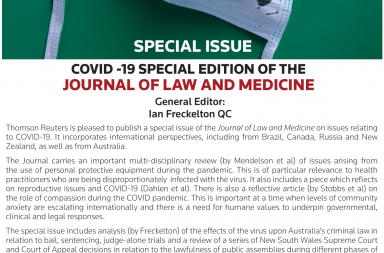The June issue of the Journal of Law and Medicine (Volume 19 Part 4) is a special issue on Donor Conception in the context of assisted reproductive technology.
Sonia Allan, a Senior Lecturer at Deakin University and Guest Editor for this special issue, outlines the range of issues and questions addressed:
“The progress of assisted reproductive technology throughout history has been both celebrated and derided. It has been a practice that, while assisting people to have children, has been cloaked in a veil of secrecy. Such secrecy reflects religious, moral and social views of the past, which were focused upon protecting the adults involved (the recipient parents, donor and doctors) and failed to consider the impact that secrecy may have upon some donor-conceived people. In recent times, little has changed. While some jurisdictions have passed laws that prohibit anonymous donations, and provide access to information for some donor-conceived people, for many people donor conception is still a clandestine practice. For those who do not have access to information, calls to lift the veil of secrecy have been steadily increasing. What is the basis for such calls? What are the psycho-social, ethical and legal arguments for and against release of information? How may competing interests be balanced? How, if the call for information is heeded, should release of information take place? These are some of the questions considered in this editorial and in the articles commissioned for this Special Issue of the Journal of Law and Medicine.”
The issues contains the following articles on the topic of Donor Conception:
- Guest editorial, Donor Conception, Secrecy and the Search for Information – Sonia Allan
- Accessing donor conception information in Australia: A call for retrospective access – Damian Adams and Caroline Lorbach
- Information rights and donor conception: Lessons from adoption? – Richard Chisholm
- Donor-conceived individuals and access to information about their genetic origins: The relevance and role of rights – John Tobin
- Keeping mum about dad: “Contracts†to protect gamete donor anonymity – Anne Rees
- Donor-conceived people’s views and experiences of their genetic origins: A critical analysis of the research evidence – Eric Blyth, Marilyn Crawshaw, Lucy Frith and Caroline Jones
- Legal parent versus biological parent: The impact of disclosure – Naomi Cahn
- Donor conception legislation in Victoria, Australia: The “Time to Tell†campaign, donor-linking and implications for clinical practice – Louise Johnson, Kate Bourne and Karin Hammarberg
This special issue will be available in paper and online in June 2012. If you would like to purchase any of the individual articles, complete the Individual Article Sale order form and email it to [email protected]. If you would like to subscribe to the Journal, click here.


